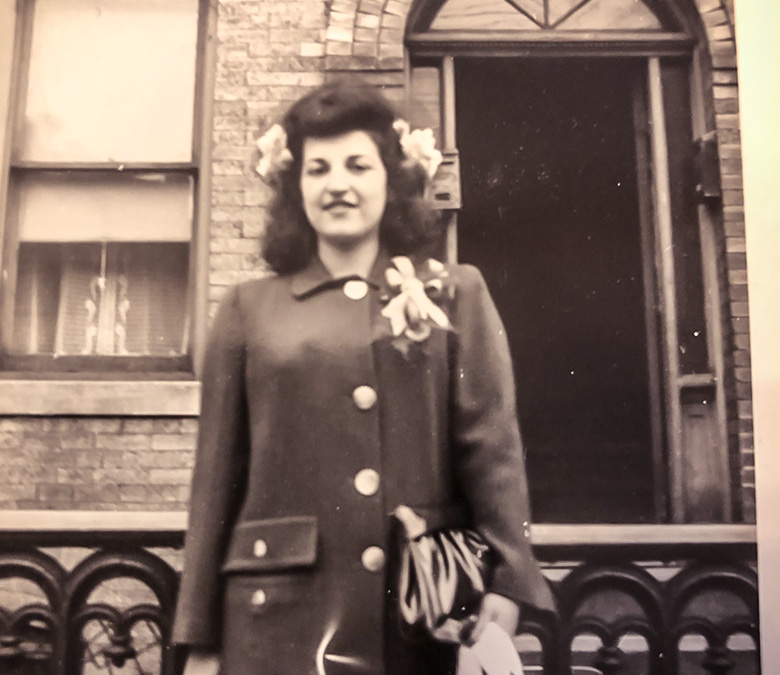FAMILY TRADITIONS WITHSTAND THE TEST OF TIME
In these days of never-ending technology, busy schedules, long work hours, countless activities (at least before the pandemic) and more recently a period of home quarantine, I find that family traditions mean more to me than ever. I have also been thinking a lot about family traditions because last year I said goodbye to my paternal grandmother, Gloria Fuggi Votto, just a few weeks shy of her 98th birthday. She was one of my favorite people on earth. As the oldest grandchild in an Italian-American family, I had a special bond with my grandparents and, given that we lived less than a mile from them, I spent a lot of time at their house growing up.
I’d like to tell you about my grandma Gloria, who I called nonna, and perhaps some of her story will resonate with you, regardless of your ethnic background or family history. She was born in 1922 in New Haven, CT to recent Italian immigrant parents. Her father, Antonio Fuggi, came from the village of Vitulano, near Benevento, by himself at the age of 15. His mother, father, sister and other relatives remained in Italy, and he never saw them again for the rest of his life. Imagine that for a minute. Leaving your family, homeland and life as a teenager never to return. The courage and fortitude are nearly impossible to comprehend. Nonna’s mother, Antonietta Meglio, came from the village of San Lupo, also near Benevento, with her mother, father, maternal grandmother and two sisters.
Antonio and Antonietta met in New Haven, were married and had five children, my nonna being number four. At home they spoke Neapolitan dialect and had a simple but wonderful life (her words, not mine). Her mother’s family, in particular, maintained a number of family traditions and customs from the old country. None more important than the food that they ate and their deep Catholic faith. The staples of the household are well known to many Italian-Americans (or anyone who enjoys and appreciates traditional Southern Italian cuisine). Red sauce on Sunday (where we usually ate “dinner” around 1.00pm), typically with meatballs, pork and/or sausage, or an occasional chicken cacciatore sauce, and a steady diet of pasta fagoli (we call it pasta fazul), escarole and beans (scarol and beans) and other simple food made from fresh ingredients that would be found in and around Naples, Italy.
Antonio drank wine, smoked cigarettes and played cards at the legendary Campania Club, all the while building a very successful business as a master shoemaker (he had finished an apprenticeship in Italy just before coming to the States). Little kids were serenaded with Italian lullabies like “Oh Maria”, and the elderly comforted with a steady diet of soup (zuppa) and visits from the neighborhood priest. Birthdays came second to your “onomastico” or name day, the feast day of the Catholic saint that shared your name. The most important in our family are St. Francis of Assisi (October 4) and St. Anthony of Padua (June 13).
I learned all these things as a child, and I’ve carried on as many of them as possible. Of course, that’s just the beginning of nonna’s profound influence on my life. Her impact really cannot be measured in words – she inspired me to go on a term abroad to Italy, where I met my wife. She inspired me to find our long-lost relatives in Southern Italy and become an Italian Citizen. And, of course, she inspired the founding of Votto Vines, which now employs half of my generation in the family, and is the fastest growing wine importing company in the United States.
Above all, what was most amazing about nonna though was her infectious kindness, incredible faith and her lack of concern for material possessions. What she did value however, were family, friends and tradition. Of those traditions, amongst the most cherished, which I’ll continue for the rest of my life are making Easter pies on Good Friday (we make a ham pie that we call “pizzagaina” and a rice pie that’s sweet) and the Feast of the Seven Fishes on Christmas Eve – although I’ll confess that we’ve evolved the menu over the past one hundred years so that it no longer includes baccala, smelts or eels. I still sing Italian lullabies to the kids, and say an extra prayer to St. Michael on September 29. I could live on hard Italian cheese, crusty bread, fresh tomatoes and the smell of fresh basil, rosemary and lavender (which is planted extensively in Italy).
But more than anything, I am eternally grateful for growing up Italian-American with an incredible Catholic faith, great food, better people, funny stories and family traditions that withstand the test of time. Thus in these days of technology, distraction and stress, I’ll contend that keeping tradition, studying history and respecting previous generations has never been more important regardless of your family background or ethnicity. I learned all that, and a lot more, from my incomparable nonna.


Oh, Michael, your nonna was my mother’s best friend, along with Mary P. I remember her making fried dough at July Fourth parties at the Brooks’ pool. And the tag sales she and my mom conducted, ending the day with a droll, “Take it,” when asked the price of something.
I had not known that her father left his family forever at the age of 15. And, no, I cannot imagine …
Mille grazie e buon compleanno a te!
My Voto family came from Salerno, Italy, along the Amalfi Coast. They also believed in Family, Faith, and Food. The Votto Vines selections have become favorites of the Voto family!
My family came from Striano, near Pompeii , the traditions that you have fdiscribed brought tears , as they were the same traditions that I grew up with & keep in my heart. My Mom recently passed in her 90’s and with her went every tradition that our family had Bless you.